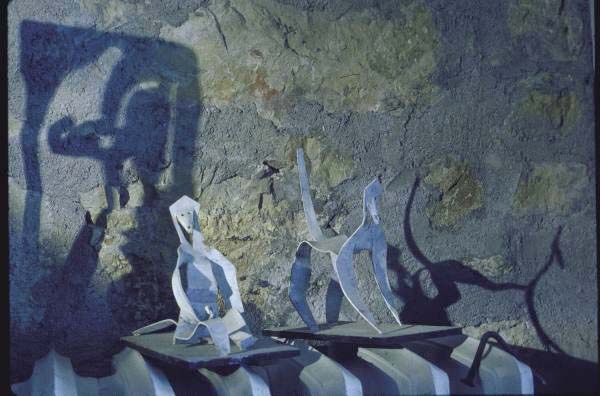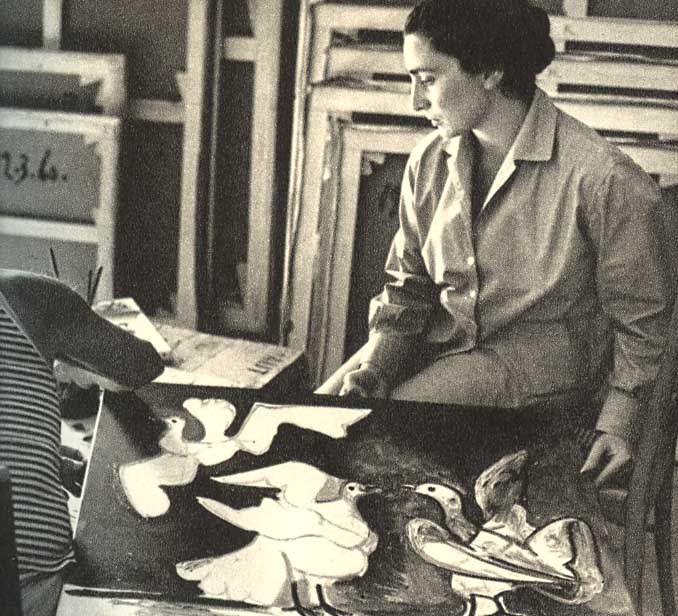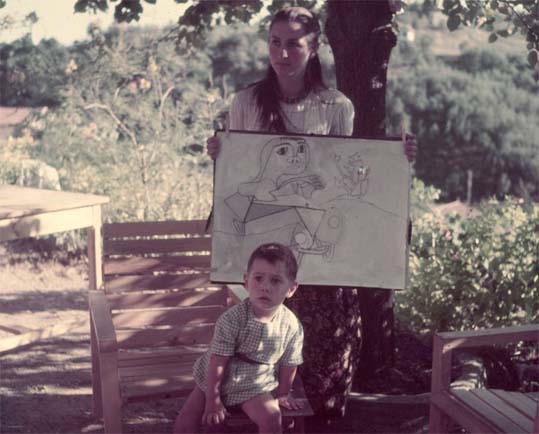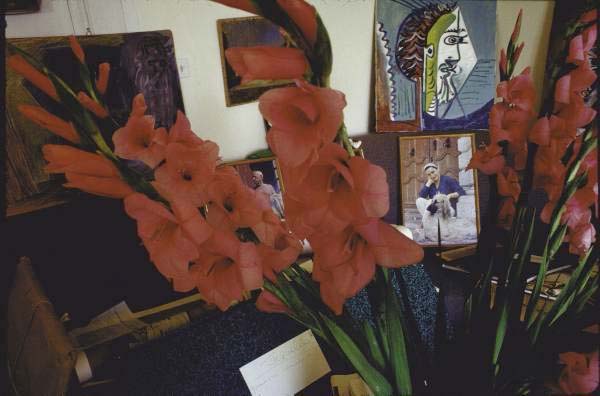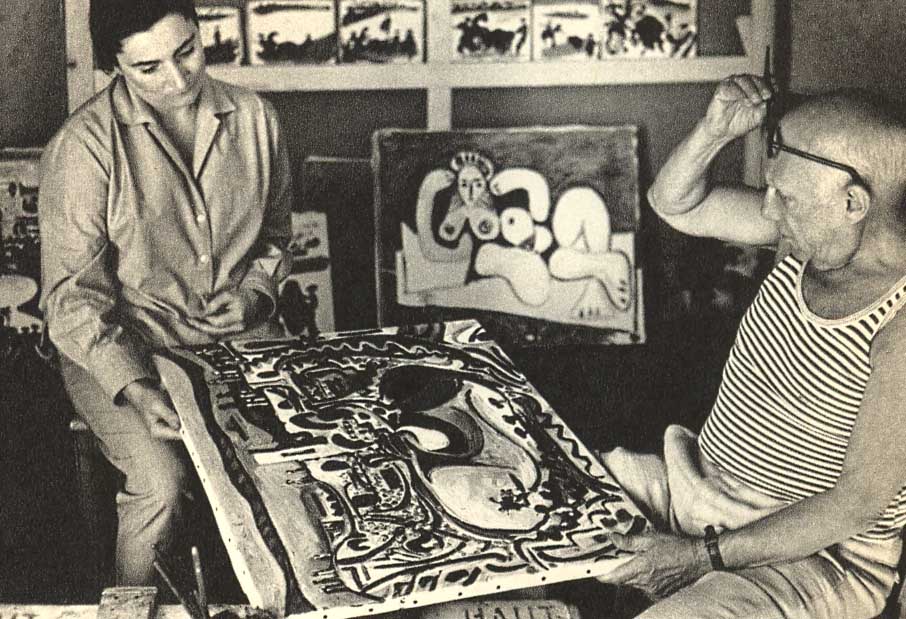 BOOKS
BOOKS In Which We Get You Writing Something Dark And Very Disturbed
 Tuesday, October 5, 2010 at 10:35AM
Tuesday, October 5, 2010 at 10:35AM 
Why and How To Write
Ever since I began my full-length memoir Jesus Was A Pale Imitation of Myself I have been deluged with responses from fans asking me how I start writing. That's a great question, but I usually don't give writing advice for free, just the actual writing. Still many authors have weighed in on this subject and we can learn much from their instruction. This is the first of a four part series. You can read the rest of the series here:
Part One (Joyce Carol Oates, Gene Wolfe, Philip Levine, Thomas Pynchon, Gertrude Stein, Eudora Welty, Don DeLillo, Anton Chekhov, Mavis Gallant, Stanley Elkin)
Part Two (James Baldwin, Henry Miller, Toni Morrison, Kurt Vonnegut Jr., Margaret Atwood, Gertrude Stein, Vladimir Nabokov)
Part Three (W. Somerset Maugham, Langston Hughes, Marguerite Duras, George Orwell, John Ashbery, Susan Sontag, Robert Creeley, John Steinbeck)
Part Four (Flannery O'Connor, Charles Baxter, Joan Didion, William Butler Yeats, Lyn Hejinian, Jean Cocteau, Francine du Plessix Gray, Roberto Bolano)

Joyce Carol Oates
Stories come to us as wraiths requiring precise embodiments. Running seems to allow me, ideally, an expanded consciousness in which I can envision what I'm writing as a film or a dream. I rarely invent at the typewriter but recall what I've experienced. I don't use a word processor but write in longhand, at considerable length. (Again, I know: writers are crazy.)
By the time I come to type out my writing formally, I've envisioned it repeatedly. I've never thought of writing as the mere arrangement of words on the page but as the attempted embodiment of a vision: a complex of emotions, raw experience.
The effort of memorable art is to evoke in the reader or spectator emotions appropriate to that effort. Running is a meditation; more practicably it allows me to scroll through, in my mind's eye, the pages I've just written, proofreading for errors and improvements.
My method is one of continuous revision. While writing a long novel, every day I loop back to earlier sections to rewrite, in order to maintain a consistent, fluid voice. When I write the final two or three chapters of a novel, I write them simultaneously with the rewriting of the opening, so that, ideally at least, the novel is like a river uniformly flowing, each passage concurrent with all the others.

Gene Wolfe
Every so often I get optimistic and explain the best method of learning to write to students. I don't believe any of them has ever tried it, but I will explain it to you now. After all, you may be the exception. When I read about this method, it was attributed to Benjamin Franklin, who invented and discovered so much. Certainly I did not invent it.
But I did it, and it worked. That is more than can be said for most creative writing classes.
Find a very short story by a writer you admire. Read it over and over until you understand everything in it. Then read it over a lot more.
Here's the key part. You must do this. Put it away where you cannot get at it. You will have to find a way to do it that works for you. Mail the story to a friend and ask him to keep it for you, or whatever. I left the story I had studied in my desk on Friday. Having no weekend access to the building in which I worked, I could not get to it until Monday morning.
When you cannot see it again. Write it yourself. You know who the characters are. You know what happens. You write it. Make it as good as you can.
Compare your story to the original, when you have access to the original again. Is your version longer? Shorter? Why? Read both versions out loud. There will be places where you had trouble. Now you can see how the author handled those problems.
If you want to learn to write fiction, and are among those rare people willing to work at it, you might want to use the little story you have just finished as one of your models. It's about the right length.

Philip Levine
Thirty-five years ago I sat in small room with Robert Lowell, then my teacher, and asked him how I might lift from its doldrums a particular poem. Lowell had spent about fifteen minutes showing me why this poem was horseshit, something I already knew, for I had come to him not for praise but for help. He had just paused in his steady assault on my poem, when I asked him how I might go about making it better. We sat in silence for over a minute. Then he looked at me, a little resigned smile on his face, and said, "You know, it's damned hard to make sense and keep the rhythm."
Nothing was clearer to me than that Lowell was remembering his own experience, and yes, he was exactly right, it is damned hard to make sense, say something worth saying and not said a thousand times before, and keep the rhythm. That was my problem at the time, and of course it still is, and there would be other down the road, problems more difficult to locate and more impossible to deal with, and there would be no Lowell to go to for help.

Thomas Pynchon
I was more concerned with committing on paper a variety of abuses, such as overwriting. I will spare everybody a detailed discussion of all the overwriting that occurs in these stories, except to mention how distressed I am at the number of tendrils that keep showing up. I still don't even know for sure what a tendril is. I think I took the word from T.S. Eliot. I have nothing against tendrils personally, but my overuse of the word is a good example of what can happen when you spend too much time and energy on words alone.
This advice has been given often and more compellingly elsewhere, but my specific piece of wrong procedure back then was, incredibly, to browse through the thesaurus and note words that sounded cool, hip, or likely to produce an effect, usually that of making me look good, without then taking the trouble to go and find out in the dictionary what they meant. If this sounds stupid, it is. I mention it only on the chance that others may be doing it even as we speak, and be able to profit from my error.
This same free advice can also be applied to items of information. Everybody gets told to write about what they know. The trouble with many of us is that the earlier stages of life we are often unaware of the scope and structure of our ignorance. Ignorance is not just a blank space on a person's mental map. It has contours and coherence, and for all I know rules of operation as well. So as a corollary to writing about what we know, maybe we should add getting familiar with our ignorance, and the possibilities therein for ruining a good story.
Opera librettos, movies and television drama are allowed to get away with all kinds of errors in detail. Too much time in front of the Tube and a writer can get to believing the same thing about fiction. Not so. Though it may not be wrong absolutely to make up, as I still do, what I don't know or am too lazy to find out, phony data are more often than not deployed in places sensitive enough to make a difference, thereby losing what marginal charm they may have possessed outside of the story's context.
Witness an example from "Entropy." In the character of Callisto I was trying for a sort of world-weary Middle-European effect, and put in the phrase grippe espagnole, which I had seen on some liner notes to a recording of Stravinsky's L'Histoire du Soldat. I must have thought this was some kind of post-World War I spiritual malaise or something. Come to find out it means what it says, Spanish influenza, and the reference I lifted was really to the worldwide flu epidemic that followed the war.

Gertrude Stein
Every writer must have common sense. He must be sensitive and serious. But he must not grow solemn. He must not listen to himself. If he does, he might as well be under a tombstone. When he takes himself solemnly, he has no more to say. Yet he must despise nothing, not even solemn people. They are part of life and it’s his job to write about life.
Be direct. Indirectness ruins good writing. There is inner confusion in the world today and because of it people are turning back to old standards like children to their mothers. This makes indirect writing.
A writer must preserve a balance between sensitivity and vitality. Highbrow writers are sensitive but not vital. Commercial writers are vital but not sensitive. Trying to keep this balance is always hard. It is the whole job of living.
When one writes a thing — when you discover and then put it down, which is the essence of discovering it — one is done with it. What people get out of it is none of the writer’s business.
Every writer is self-conscious. It’s one reason he is a writer. And he is lonely. If you know three writers in a lifetime, that is a great many.
You do not have to write what the editors want. You can write what you want and if you develop sufficient craftsmanship, you can sell it, too. I want you to write for the Saturday Evening Post. It demands the best craftsmanship.

Roberto Bolaño
Now that I’m forty-four years old, I’m going to offer some advice on the art of writing short stories.
1. Never approach short stories one at a time. If one approaches short stories one at a time, one can quite honestly be writing the same short story until the day one dies.
2. It is best to write short stories three or five at a time. If one has the energy, write them nine or fifteen at a time.
3. Be careful: the temptation to write short stories two at a time is just as dangerous as attempting to write them one at a time, and, what’s more, it’s essentially like the interplay of lovers’ mirrors, creating a double image that produces melancholy.
4. One must read Horacio Quiroga, Felisberto Hernández, and Jorge Luis Borges. One must read Juan Rulfo and Augusto Monterroso. Any short-story writer who has some appreciation for these authors will never read Camilo José Cela or Francisco Umbral yet will, indeed, read Julio Cortázar and Adolfo Bioy Casares, but in no way Cela or Umbral.
5. I’ll repeat this once more in case it’s still not clear: don’t consider Cela or Umbral, whatsoever.
6. A short-story writer should be brave. It’s a sad fact to acknowledge, but that’s the way it is.
7. Short-story writers customarily brag about having read Petrus Borel. In fact, many short-story writers are notorious for trying to imitate Borel’s writing. What a huge mistake! Instead, they should imitate the way Borel dresses. But the truth is that they hardly know anything about him—or Théophile Gautier or Gérard de Nerval!
8. Let’s come to an agreement: read Petrus Borel, dress like Petrus Borel, but also read Jules Renard and Marcel Schwob. Above all, read Schwob, then move on to Alfonso Reyes and from there go to Borges.
9. The honest truth is that with Edgar Allan Poe, we would all have more than enough good material to read.
10. Give thought to point number 9. Think and reflect on it. You still have time. Think about number 9. To the extent possible, do so on bended knees.
11. One should also read a few other highly recommended books and authors— e.g., Peri hypsous, by the notable Pseudo-Longinus; the sonnets of the unfortunate and brave Philip Sidney, whose biography Lord Brooke wrote; The Spoon River Anthology, by Edgar Lee Masters; Suicidios ejemplares, by Enrique Vila-Matas; and Mientras ellas duermen by Javier Marías.
12. Read these books and also read Anton Chekhov and Raymond Carver, for one of the two of them is the best writer of the twentieth century.
translated from the Spanish by David Draper Clark

Eudora Welty
Ever since I was first read to, then started reading to myself, there has never been a line read that I didn't hear. As my eyes followed the sentence, a voice was saying it silently to me. It isn't my mother's voice, or the voice of any person I can identify, certainly not my own. It is human, but inward, and it is inwardly that I listen to it. It is to me the voice of the story or the poem itself. The cadence, whatever it is that asks you to believe, the feeling that resides in the printed word, reaches me through the reader-voice.
I have supposed, but never found out, that this is the case with all readers — to read as listeners. It may be part of the desire to write. The sound of what falls on the page begins the process of testing it for truth, for me. Whether I am right to trust so far I don't know. By now I don't know whether I could do either one, reading or writing, without the other. My own words, when I am at work on a story, I hear too as they go, in the same voice that I hear when I read in books. When I write and the sound of it comes back to my ears, then I act to make changes. I have always trusted this voice.

Don DeLillo
I think the scene comes first, an idea of a character in a place. It's visual, it's Technicolor — something I see in a vague way. Then sentence by sentence into the breach. No outlines — maybe a short list of items, chronological, that may represent the next twenty pages. But the basic work is built around the sentence. This is what I mean when I call myself a writer. I construct sentences. There's a rhythm I hear that drives me through a sentence. And the words typed on the white page have a sculptural quality. They form odd correspondences. They match up not just through meaning but through sound and look. The rhythm of a sentence will accommodate a certain number of syllables. One syllable too many, I look for another word. There's always another word that means nearly the same thing, and if it doesn't then I'll consider altering the meaning of a sentence to keep the rhythm, the syllable beat. I'm completely willing to let language press meaning upon me. Watching the way in which words match up, keeping the balance in a sentence — these are sensuous pleasures. I might want very and only in the same sentence, spaced in a particular way, exactly so far apart. I might want rapture matched with danger — I like to match word endings. I type rather than write longhand because I like the way words and letters look when they come off the hammers onto the page — finished, printed, beautifully formed.
When I was working on The Names I devised a new method — new to me, anyway. When I finished a paragraph, even a three-line paragraph, I automatically went to a fresh page to start the new paragraph. No crowded pages. This enabled me to see a given set of sentences more clearly. It made rewriting easier and more effective. The white space on the page helped me concentrate more deeply on what I'd written.

Anton Chekhov
One must be a god to be able to tell successes from failures without making a mistake.
I think descriptions of nature should be very short and always be à propos. Commonplaces like "The setting sun, sinking into the waves of the darkening sea, cast its purple gold rays, etc," "Swallows, flitting over the surface of the water, twittered gaily" — eliminate such commonplaces. You have to choose small details in describing nature, grouping them in such a way that if you close your eyes after reading it you can picture the whole thing. For example, you'll get a picture of a moonlit night if you write that on the dam of the mill a piece of broken bottle flashed like a bright star and the black shadow of a dog or a wolf rolled by like a ball, etc.
In the realm of psychology you also need details. God preserve you from commonplaces. Best of all, shun all descriptions of the characters' spiritual state. You must try to have that state emerge clearly from their actions. Don't try for too many characters. The center of gravity should reside in two: he and she.
When you describe the miserable and unfortunate, and want to make the reader feel pity, try to be somewhat colder — that seems to give a kind of background to another's grief, against which it stands out more clearly. Whereas in your story the characters cry and you sigh. Yes, be more cold. ... The more objective you are, the stronger will be the impression you make.
My own experience is that once a story has been written, one has to cross out the beginning and the end. It is there that we authors do most of our lying.

Mavis Gallant
I still do not know what impels anyone sound of mind to leave dry land and spend a lifetime describing people who do not exist. If it is child's play, an extension of make-believe - something one is frequently assured by persons who write about writing - how to account for the overriding wish to do just that, only that, and consider it as rational an occupation as riding a racing bike over the Alps? Perhaps the cultural attaché at a Canadian embassy who said to me "Yes, but what do you really do?" was expressing an adult opinion.
The impulse to write and the stubbornness needed to keep going are supposed to come out of some drastic shaking up, early in life. There is even a term for it: the shock of change. Probably, it means a jolt that unbolts the door between perception and imagination and leaves it ajar for life, or that fuses memory and language and waking dreams.
The first flash of fiction arrives without words. It consists of a fixed image, like a slide or (closer still) a freeze frame, showing characters in a simple situation.
Stories are not chapters of novels. They should not be read one after another, as if they were meant to follow along. Read one. Shut the book. Read something else. Come back later. Stories can wait.

Stanley Elkin
My editor at Random House, Joe Fox, used to tell me, “Stanley, less is more.” He wanted to strike — oh, he had a marvelous eye for the “good” stuff — and that’s what he wanted to strike. I had to fight him tooth and nail in the better restaurants to maintain excess because I don’t believe that less is more. I believe that more is more. I believe that less is less, fat fat, thin thin and enough is enough. There’s a famous exchange between Fitzgerald and Thomas Wolfe in which Fitzgerald criticizes Wolfe for one of his novels. Fitzgerald tells him that Flaubert believed in the mot précis and that there are two kinds of writers—the putter-inners and the taker-outers. Wolfe, who probably was not as good a writer as Fitzgerald but evidently wrote a better letter, said, “Flaubert me no Flauberts. Shakespeare was a putter-inner, Melville was a putter-inner.”* I can’t remember who else was a putter-inner, but I’d rather be a putter-inner than a taker-outer.
I do have an ideal audience in mind. That ideal audience is a man like Bill Gass, or someone like Howard Nemerov, or any other writer who respects language. But other than that, no notion at all of an audience. I don’t think any writer does. I don’t think that poor Jacqueline Susann had any notion of an audience. I think she was doing the best she could. There is no such thing as prostitution in writing. One writes what one can write. One writes up, though one man’s up is another man’s basement.
Like most people of my generation, I fell in love with the philosophy of existentialism. There is no particular religious tradition in my work. There is only one psychological assertion that I would insist upon. That is: the self takes precedence.
You can find the second part of this series here. You can find the third part here.

Faulkner on This Recording Timeline:
1897: Faulkner born.
1950: Faulkner receives Nobel Prize.
1982: Will Hubbard born.
2009: Faulkner named No. 1 writer of all time.
2009: Joseph Blotner weighs in.
2009: Eleanor Morrow on The Long, Hot Summer.
2010: Potentially abrasive but verifiably true article about William Faulkner published.
2012: Faulkner reappears somewhere in Southern Virginia and asks for whatever liquor you have in the house.
2020: Faulkner makes his debut on Dancing With the Stars.
2044: Alex Balk becomes president of the United States.

Part One (Joyce Carol Oates, Gene Wolfe, Philip Levine, Thomas Pynchon, Gertrude Stein, Eudora Welty, Don DeLillo, Anton Chekhov, Mavis Gallant, Stanley Elkin)
Part Two (James Baldwin, Henry Miller, Toni Morrison, Kurt Vonnegut Jr., Margaret Atwood, Gertrude Stein, Vladimir Nabokov)
Part Three (W. Somerset Maugham, Langston Hughes, Marguerite Duras, George Orwell, John Ashbery, Susan Sontag, Robert Creeley, John Steinbeck)
Part Four (Flannery O'Connor, Charles Baxter, Joan Didion, William Butler Yeats, Lyn Hejinian, Jean Cocteau, Francine du Plessix Gray, Roberto Bolano)
 joyce carol oates
joyce carol oates































